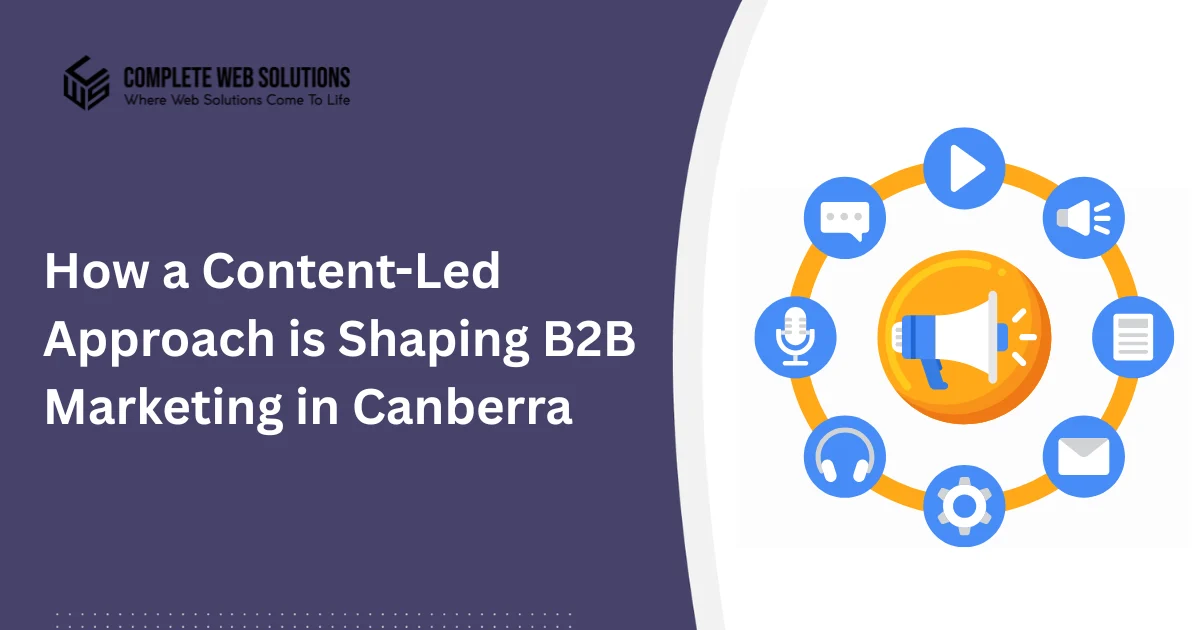Canberra, as the political and administrative heart of Australia, hosts a vibrant ecosystem of B2B organisations – from government contractors and consulting firms to technology companies and research institutions. In this environment, traditional B2B marketing tactics (think cold calls, networking events, and brochureware websites) are giving way to a more modern strategy: a content-led approach. Embracing content as the core of your marketing isn’t just a trendy idea; it’s rapidly becoming the future of B2B marketing in Canberra and beyond. Here’s why:
The Changing Behavior of B2B Buyers in Canberra
B2B buyers today, including those in Canberra’s government and corporate circles, behave more like consumers than ever before. They research extensively online, seek peer reviews, and consume multiple pieces of content prior to making decisions. In fact, B2B buyers typically engage with 3 to 7 pieces of content before talking to a sales rep, and a notable portion consume even more. A content-led approach means you are providing those whitepapers, case studies, videos, and blogs that potential clients are hunting for during their research phase.
Think about a procurement manager in a Canberra government department looking for a new IT solution. Before reaching out to vendors, they might download an eBook on “Best Practices for Data Security in Government (2025)” or read a case study about how another department implemented a similar solution. If your company provided that content, you’ve just made their shortlist without any direct pitch – your content did the marketing for you by demonstrating expertise and providing value.
Building Trust through Thought Leadership 
Canberra’s B2B landscape – especially with many government-related contracts – often hinges on trust and credibility. A content-led approach helps establish your company as a thought leader. When you regularly publish insightful content (say, a policy brief on new regulations affecting your industry or a research-backed article on emerging trends), you show that you understand the challenges and context your clients operate in. This is far more compelling than just claiming “we’re the best” in a sales brochure.
Content allows you to show rather than tell. A firm that releases a well-crafted study on “Digital Transformation in the Australian Public Sector: Challenges and Opportunities” will likely gain recognition in Canberra circles. That recognition can translate to being top-of-mind when agencies need digital transformation partners. It’s no surprise that 60% of B2B buyers say that content helps them make purchase decisions on their own (without needing a salesperson’s guidance) – because the content itself builds the necessary trust and knowledge.
Moreover, a steady stream of quality content signals stability and commitment to helping clients. If a competitor’s site hasn’t updated their news or blog in two years, but yours publishes monthly or weekly insights, who looks more attuned to current issues? The future of B2B marketing won’t favor the silent. It will favor those actively contributing to the industry conversation and helping customers solve problems through content.
Supporting a Complex Buyer’s Journey with Relevant Content
In B2B, especially in Canberra’s context where multiple stakeholders and lengthy procurement processes are common, the buyer’s journey can be long and complex. A content-led approach ensures you have tailored content for each stage of that journey:
- Awareness Stage: Content here draws attention to a problem or need. For example, a Canberra HR consultancy might publish a blog “How Remote Work is Changing Government Agencies in Canberra” – making potential clients aware of a challenge or trend.
- Consideration Stage: Content here helps prospects evaluate options or approaches. The same consultancy could release a guide on “In-House Training vs. Outsourced Workshops for Public Service Teams” – helping the reader weigh solutions.
- Decision Stage: Content aimed at decision-makers to validate the choice. This could be case studies (“How Department X Improved Employee Retention by 25% with Our Program”) or webinars where they can directly ask experts questions.
You accompany the prospect through their journey by mapping content to these stages. They might first encounter your infographic on LinkedIn, later subscribe to download a guide, and finally attend a webinar you host. At each step, content is doing the nurturing in a way that a sales pitch cannot. And importantly, this content works for multiple prospects at once – it’s scalable. One blog post could influence dozens of different organisations quietly in the background (via search or shares), whereas a sales call influences one at a time.
In Canberra, where much B2B business involves RFPs and formal proposal processes, content marketing can preemptively answer many questions. By the time an RFP is out, a content-equipped firm has already showcased its knowledge and approach publicly, which can make its proposal stand out as evaluators are likely to have come across its insights beforehand.
Leveraging Local and Specialized Knowledge as Content
Canberra businesses often operate in specialized niches – defence technology, public policy consulting, environmental research, etc. A content-led strategy leverages this specialized knowledge by turning it outward. If you’re an expert, prove it via content. For example:
- An environmental consultancy could maintain a blog on “Climate Adaptation Strategies for the ACT Region” citing local case studies.
- A cybersecurity firm might publish regular updates on government cybersecurity mandates and how to comply with them.
- A financial services company could produce quarterly economic outlooks with a Canberra/regional perspective.
This does two things: it educates potential clients (providing immediate value) and it signals that your team stays current with local and industry developments. Especially when targeting government clients, demonstrating awareness of local legislation or directives through content can be a huge plus. You’re effectively aligning your marketing with Canberra’s specific context, which generic content from a multinational company might not do.
Also, don’t overlook the power of local content collaboration. In Canberra’s close-knit B2B community, co-authoring content or participating in each other’s webinars/podcasts can amplify reach. For instance, a financial consulting firm and a legal firm might jointly produce a guide on “Navigating New Federal Financial Regulations – A Guide for Canberra Businesses”. Such collaborations double credibility and tap into each other’s networks – a content-marketing-centric approach to partner marketing that raises the profile of both parties among an influential local audience.
Measurable ROI and Efficiency
One reason content-led marketing is the future: it’s measurable and often more cost-effective than traditional B2B marketing channels. With analytics tools, you can track exactly how many Canberra CEOs downloaded your report or how many policy advisors subscribed to your newsletter after a conference where you promoted it. You can see what content is influencing deals by tracking touchpoints (maybe a certain whitepaper is commonly read by leads before they sign up for a demo).
Over time, content becomes a library of assets that continually draw in leads. Unlike a one-off ad or an event that ends after a day, an evergreen piece of content like “The Ultimate Guide to Procurement in Australian Government” can keep attracting traffic and leads year after year. The upfront cost of producing high-quality content might involve time and expertise, but its longevity offers compounding returns. Content keeps working in the background to educate new folks entering the pipeline in a city with as many long sales cycles as Canberra (think government and enterprise).
Additionally, when you have robust content, your other marketing efforts become more efficient. Sales teams can use content as door-openers or follow-up material (“I’m sharing an article our team wrote about the challenges you mentioned…”), which warms up cold outreach. Your SEO (as discussed earlier) improves, lowering the need for expensive paid campaigns for visibility. Your social media has valuable things to share beyond just company news. It all interlocks into a more effective strategy.
Adapting to the Future: AI, Personalization, and Content
Looking ahead, content-led B2B marketing is set to integrate with technologies like AI and personalization, making it even more powerful. We’re already seeing tools that can customize content recommendations on your site based on who’s visiting. For instance, if someone from a .gov.au domain in Canberra visits, your site might showcase case studies relevant to the public sector or display a banner about your government services. If you have a rich content base, leveraging these tools can create a highly personalized experience that traditional marketing can’t match.
AI might help with analyzing which topics perform best or even assist in drafting content (under human guidance), allowing Canberra marketers to fine-tune their content strategy continuously. But the strategic insight – the thought leadership angle – will still come from your human experts. That’s not something AI can replicate in context-rich fields like policy advice or complex tech solutions. Those who harness content now are building an asset that will carry them into the future, even as tech evolves around how content is delivered.
Conclusion: Content at the Core
The future of B2B marketing in Canberra will belong to those organisations that effectively put content at the core of their strategy. This content-led approach doesn’t mean abandoning all other marketing; it means enhancing and unifying all marketing efforts with valuable content. It shifts the mindset from “How do we sell our product/service?” to “How do we help our target audience succeed (through our expertise)?”.
In a city like Canberra where relationships, knowledge, and credibility are paramount (think of all the forums, committees, and networks where information is exchanged), content marketing is essentially doing that knowledge-sharing at scale. It’s an invitation to potential clients to engage with you intellectually before they engage with you commercially.
So if you’re planning your B2B marketing strategy for the coming years, assess your content game. Are you regularly producing material that your ideal clients find useful? If not, now is the time to start. In the future, the most successful Canberra B2B brands will be known not just for their services or products, but for the insightful content they contribute – making them trusted advisors and partners even before any contracts are signed. Embrace the content-led future, and you’ll likely find your marketing becoming more effective and your client relationships stronger even before the first meeting.

